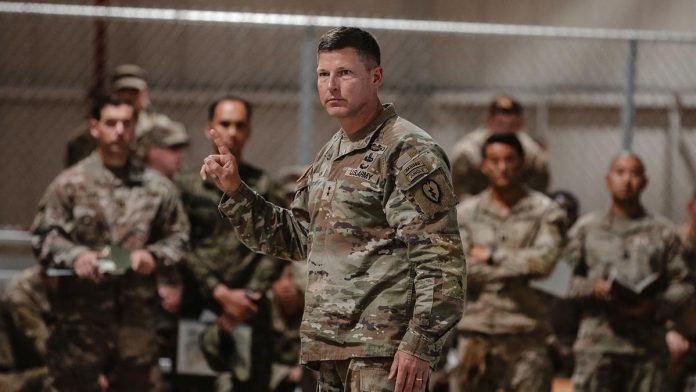The United States will rely on allies rather than a major expansion of its own forces to counter any Chinese military risk in the Pacific, a U.S general has told AFP.
Beijing enjoys “very clear” advantages in the region, said Major General Joseph Ryan, commander of the 12,000-strong 25th Infantry Division on Oahu, Hawaii.
He cited China’s expanding military defences, its long-range rocket missile capability and the ease with which it can position forces and equipment in the Pacific.
By contrast, in the event of conflict, the United States and its allies would have to traverse international waters or the territories of multiple nations, requiring their permission as well as the mobilisation of air, land and sea transport.
“I don’t see a major expansion of U.S military presence in the region,” Ryan said while in Darwin at the weekend for multinational military exercise Talisman Sabre.
“What I do see is increased partnership, opportunities for partnership and perhaps some increased growth in the region,” he said.
Tensions between Beijing and Washington have flared in recent years over self-ruled Taiwan, China’s disputed claims over a swathe of the South China Sea and a tug-of-war for influence in the South Pacific.
China claims the democratic island of Taiwan as part of its territory and has vowed to take it, by force if necessary.
But Ryan said this may be “only the first issue in a larger campaign” by China to “at a minimum, become a regional hegemon in Southeast Asia, but certainly to enhance their global aspirations”.
According to the U.S Defence Department, China has the world’s largest navy, the third-largest air force, and by some measures, the biggest army.
The U.S relationship with Solomon Islands, which last year signed a secretive defence pact with China, was “complicated”, the general said, despite a shared history dating back to World War II when Allied forces fought the Japanese on the island of Guadalcanal.
Ryan said he could understand why the Solomons might be “frustrated” with the United States, following a recent visit he made to the archipelago.
“I was struck by the lack of development there so I am not surprised that our relationship with the Solomons remains complicated today, because we were there, we fought hard there, and now there are some challenges there and we haven’t been back,” he said.
The United States restored its embassy in Solomon Islands in February after a 30-year hiatus. Three months later, it opened an embassy in Tonga. U.S embassies are also planned for Vanuatu and Kiribati.
Solomon Islands is a sovereign nation but it should be “careful” about its relationship with China, the general said.
Beijing, too, had “every right” to operate in the region, he said, “as long as everybody is obeying the same set of international norms that have been set since World War II”.
“But they’ve shown a direct proclivity not to do that — an affront to many of our allies and partners in the region,” Ryan added.
The United States’ Indo-Pacific Strategy, released last year, prioritised alliances over trying to shape China’s activities through direct engagement.
Ryan said U.S participation in the Talisman Sabre exercise demonstrated the U.S commitment to its partners.
He denied Washington was asking Pacific countries to choose between the United States and China.
“We’re simply asking them to act in their best interests and to consider that the U.S wants to partner with them, and other free and independent nations who value their sovereignty in the region — like Australia and New Zealand — want to partner with them” he said.
SOURCE: AFP/PACNEWS














